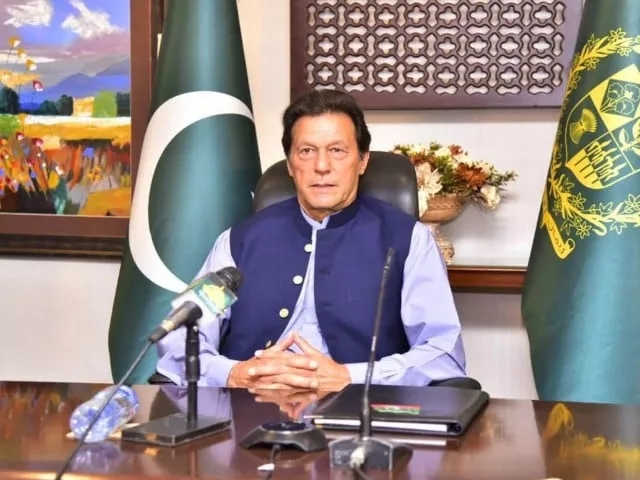‘Pakistan's virus turnaround a political triumph of PM Imran’
PTI govt switched to a strategy of targeted lockdowns of local areas where a cluster of cases had arisen
NEW YORK:As Pakistan experienced surprisingly steep decline of Covid-19 infections from 6,825 cases a day in mid-June to just 553 on Sunday, the medical experts say the turnaround is "real" and "promising" while the political circles call it Prime Minister Imran Khan's political triumph.
Two months ago, Pakistan was seemingly heading towards a disaster and was being compared with similar-sized Covid-ravaged Brazil, but the country dramatically reversed course, recording a sharp decline in coronavirus cases and deaths, which are both down more than 80% from their peaks, according to a report published in Wall Street Journal.
Major hospitals report beds are freeing up in previously overflowing coronavirus wards, even in the nation's biggest and hardest-hit city, Karachi. The tally of patients on ventilators has halved over the past month.
This is all happening as Pakistan's neighbours to the east and west—India and Iran—are still reporting that infection rates are climbing steadily. "Even more surprising, the progress in Pakistan came after Prime Minister Imran Khan resisted advice from the World Health Organization, declaring in May that lockdowns are too costly for the poor and reopening the economy," the American daily said.
"We charted the tough course between a strict lockdown and completely opening up," said Dr Faisal Sultan, an infectious diseases physician, also the prime minister's adviser for Covid-19.
Thought the health authorities still worry about the possible resurgence of the virus after Eid and upcoming Muharram, they however believe that the turnaround trend was clear as the proportion of tests coming back positive has more than halved.
Pakistan locked its economy down in March, early on in its outbreak, which kept the virus from spreading widely while the population stayed home. But after restrictions were lifted in May, many Pakistanis celebrated Eid ul Fitr with shopping sprees and visits to family. That unleashed a burst of infections.
The rapid spread jolted people into changing their behavior, with more mask-wearing, handwashing and maintaining social distance, Dr Sultan said. The preventive messages increased from the government and public service campaigns.
The government switched to a strategy of targeted lockdowns of local areas where a cluster of cases had arisen, sometimes just on one street.
These days, Dr. Faisal Mahmood, a professor at the teaching hospital of Karachi's Aga Khan University, said he is seeing more people in his clinic who are having problems recovering from Covid-19 than those currently infected. "The drop is real, though I was skeptical initially," Dr Mahmood said.
From a peak of nearly 7,000 new cases of infection a day in June, on Friday the country reported 903 new cases. This week, Pakistan recorded its lowest death count in three months, with 27 on Friday.
So far, fewer than 6,000 people have died, with 278,000 recorded cases of infection. Brazil has about the same size population as Pakistan, but has reported more than 92,000 deaths and 2.7 million cases, according to Johns Hopkins University. The highest number of patients to die in a day was 153, on June 20.
"The decline in Pakistan is promising," said Anna Vassall, a professor at the London School of Hygiene and Tropical Medicine. "But we are not yet certain as to the cause, nor how long it will last. The spread of Covid-19 is driven by social behavior and it is difficult to measure how that has changed."
But Pakistan has some unique characteristics that have likely been helpful in beating the virus back, health experts say. Pakistan has just one mega city, Karachi, while India has several. And Karachi isn't a high-rise city. Denser urban settings given the virus the best opportunity to spread. In Pakistan, the virus remained confined not just to the bigger cities but to pockets within those cities, officials say.
Dr Adnan Khan, a doctor who is chief knowledge officer at Research and Development Solutions, a consulting firm, said social circles in any country are limited to family, friends, work colleagues and more. Some economic research suggests that social networks are smaller in poorer countries, he said.
For supporters of the prime minister, the shrinking coronavirus threat is a political triumph. Critics earlier predicted that his strategy would lead to catastrophe. Pakistan Army that has also played an important role in anti-Covid efforts, won public applause, analysts say.
Officials say complacency could still reverse people's behavior and spread the disease. Schools will likely open in September—same for wedding halls.
The government had appealed to the public to exercise restraint on Eid. As farmers return from selling their animals for slaughter in the cities, they could carry the virus into rural areas for the first time, experts warn.


COMMENTS
Comments are moderated and generally will be posted if they are on-topic and not abusive.
For more information, please see our Comments FAQ